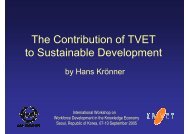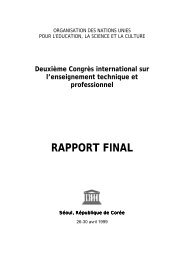Learning for Life, Work and the Future Initial ... - Unesco-Unevoc
Learning for Life, Work and the Future Initial ... - Unesco-Unevoc
Learning for Life, Work and the Future Initial ... - Unesco-Unevoc
You also want an ePaper? Increase the reach of your titles
YUMPU automatically turns print PDFs into web optimized ePapers that Google loves.
Page 12 Main <strong>Work</strong>ing Document <strong>Learning</strong> <strong>for</strong> <strong>Life</strong>, <strong>Work</strong> <strong>and</strong> <strong>the</strong> <strong>Future</strong><br />
2 The Purpose of <strong>the</strong> <strong>Work</strong>shop<br />
The main objective of this workshop is to stimulate<br />
regional co-operation in <strong>the</strong> re<strong>for</strong>m of technical <strong>and</strong><br />
vocational education; <strong>the</strong> main outcome is to identify,<br />
prioritise <strong>and</strong> initiate subregional projects which will<br />
facilitate re<strong>for</strong>ms of TVET in <strong>the</strong> subregion with<br />
emphasis on <strong>the</strong> following key issues or challenges:<br />
• Access to TVET<br />
• Raising <strong>the</strong> quality of TVET<br />
• Staff training <strong>and</strong> professional development<br />
• Recognition <strong>and</strong> accreditation of qualifications<br />
within <strong>the</strong> TVET system<br />
• Unemployment<br />
• Training <strong>for</strong> <strong>the</strong> in<strong>for</strong>mal sector<br />
• The role of ICT in <strong>the</strong> TVET system<br />
• The impact of HIV/AIDS within <strong>the</strong> TVET system.<br />
The issues <strong>and</strong> problems are discussed in more detail<br />
below, taking into consideration matters raised in <strong>the</strong><br />
papers prepared by <strong>the</strong> various participants from <strong>the</strong><br />
subregion. It should be noted that <strong>the</strong> relevance <strong>and</strong><br />
use of ICT permeates through all <strong>the</strong>se issues.<br />
3 Access to TVET<br />
This is an issue that permeates all national policies on<br />
TVET. Most papers submitted stated that dem<strong>and</strong> <strong>for</strong><br />
TVET places is much greater than supply. Equal<br />
access <strong>and</strong> opportunity is illusory because of inadequate<br />
facilities <strong>and</strong> equipment.<br />
The existing infrastructure <strong>and</strong> programmes still<br />
need to be improved in a number of ways to cope<br />
with <strong>the</strong> increased number of students.<br />
(Munetsi, Zimbabwe)<br />
Much of <strong>the</strong> dem<strong>and</strong> lies not in urban areas, but in<br />
rural <strong>and</strong> remote areas where education <strong>and</strong> training<br />
facilities are under-resourced or non-existent.<br />
(Kopeka <strong>and</strong> Waterman, Lesotho)<br />
Regarding <strong>the</strong> issue of equal opportunities, one of <strong>the</strong><br />
Zambian papers stated that:<br />
The equal opportunities philosophy, although written<br />
down, has been very difficult to implement. For<br />
example, <strong>the</strong> retired <strong>and</strong> <strong>the</strong> retrenched need<br />
retraining but <strong>the</strong>re are no special courses <strong>for</strong> <strong>the</strong>se<br />
people...<strong>the</strong> same applies to women <strong>and</strong> to those with<br />
special needs. (Mupanga, Zambia)<br />
The suitability of TVET programmes <strong>for</strong> different<br />
target groups <strong>and</strong> local needs also affects access.<br />
The 1996 policy on TVET emphasises dem<strong>and</strong>-driven<br />
training as most programmes were completely at<br />
variance with what was happening in industry.<br />
(Mupanga, Zambia)<br />
In response to this ‘dem<strong>and</strong>ing’ challenge, a system<br />
of Technical, Entrepreneurial <strong>and</strong> Vocational<br />
Education <strong>and</strong> Training (TVET) was created which is<br />
flexible <strong>and</strong> dem<strong>and</strong>-driven, <strong>and</strong> focuses on <strong>the</strong> skills<br />
<strong>and</strong> competencies required in <strong>the</strong> labour market.<br />
(Chafa, Malawi)<br />
The Mauritius paper fur<strong>the</strong>r endorses this issue by<br />
stating that:<br />
A Mauritian work<strong>for</strong>ce that is skilled, knowledgeable,<br />
competent, flexible <strong>and</strong> always re-skilling <strong>and</strong>/or upgrading<br />
itself is necessary not only to attract <strong>for</strong>eign<br />
direct investment but also to ensure its capacity to be<br />
more productive, innovative <strong>and</strong> competitive. Programmes<br />
to fit people ra<strong>the</strong>r than people fitting into<br />
programmes. (Dubois, Mauritius)<br />
In translating equality of access into full equality of<br />
participation, <strong>the</strong> priority must <strong>the</strong>re<strong>for</strong>e be to tackle<br />
<strong>the</strong>se barriers to participation. Possible solutions include<br />
<strong>the</strong> innovative use of facilities; cost-effective<br />
design <strong>and</strong> construction of facilities <strong>and</strong> <strong>the</strong>ir usage;<br />
putting equal opportunities policies in place; having a<br />
wide range of programmes that are flexible to suit all<br />
target groups.<br />
4 Quality of TVET<br />
A South African Experience: Integration of<br />
Education <strong>and</strong> Training in South Africa<br />
Traditionally education <strong>and</strong> training were seen <strong>and</strong><br />
treated as separate entities with separate <strong>and</strong> disparate<br />
purposes. The <strong>for</strong>mer was seen primarily as a<br />
means of developing <strong>the</strong> child as a person while <strong>the</strong><br />
latter prepares <strong>the</strong> person <strong>for</strong> <strong>the</strong> per<strong>for</strong>mance of a<br />
specific type of work. The concept of integration, of<br />
an integrated approach to education <strong>and</strong> training,<br />
dem<strong>and</strong>s an ef<strong>for</strong>t to recast <strong>the</strong> thinking about education<br />
<strong>and</strong> training in <strong>the</strong> traditional mould as<br />
separate definable entities, limited to certain periods<br />
of an individual’s life, into thinking about <strong>the</strong>m as a<br />
single entity within a single system. Education <strong>and</strong><br />
training should be seen as a lifelong learning process<br />
in order to enhance quality of life <strong>for</strong> all.<br />
(Samuels, South Africa)<br />
If <strong>the</strong>re is general acceptance of this view, we should<br />
rephrase <strong>the</strong> statement in <strong>the</strong> World Declaration on<br />
Education <strong>for</strong> All regarding learning to read as follows:<br />
Whe<strong>the</strong>r or not exp<strong>and</strong>ed education <strong>and</strong> training<br />
opportunities will translate into meaningful development<br />
− <strong>for</strong> an individual or <strong>for</strong> society − depends<br />
ultimately on whe<strong>the</strong>r people actually learn as a<br />
result of those opportunities; that is, whe<strong>the</strong>r <strong>the</strong>y<br />
incorporate useful knowledge, reasoning ability,<br />
skills <strong>and</strong> values.<br />
Our interpretation of ‘quality’ should be much more<br />
than <strong>the</strong> sum of institutional buildings, teacher-training<br />
programmes, curriculum re<strong>for</strong>ms, <strong>and</strong> provision of<br />
learning, training <strong>and</strong> teaching materials <strong>and</strong> equipment.<br />
It should be based on <strong>the</strong> belief that if education<br />
<strong>and</strong> training is to succeed in its complex task of<br />
responding to <strong>the</strong> multiplicity of dem<strong>and</strong>s, it must be<br />
organised around four fundamental types of learning<br />
which Delors refers to as <strong>the</strong> Four Pillars of<br />
Education:





